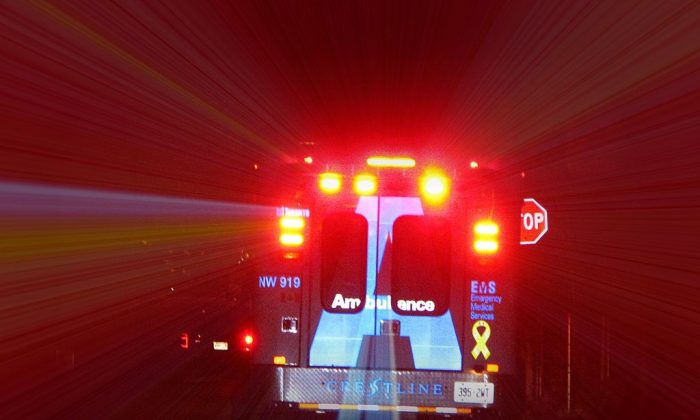A 28-year-old man decided he would stretch his neck because it was sore, but he then accidentally popped it. Josh Hader from Guthrie, Oklahoma, then felt the left side of his body go numb—he was suffering from a major stroke, and nearly lost his life.
“The moment I heard the pop, everything on my left side started to go numb,” the father of two said.
The stroke from neck-popping happened March 14.
“I got up and tried to get an ice pack from the fridge, and I remember I couldn’t walk straight,” Hader told ABC affiliate KOCO.
Hader’s father-in-law helped rush him to the emergency room. Hader recalled about six to seven nurses and doctors surrounding him.
They gave him TPA (tissue plasminogen activator), which helped to break up clots. According to CNN, he was then transferred to Mercy Hospital in Oklahoma City and stayed in the intensive care unit for four days, and was later sent to in-patient therapy.
Dr. Vance McCollom, who treated Hader, said that Hader had numbness, weakness, and double vision when he presented to the hospital.
“His wife had been telling him, ‘Don’t pop your neck. You’re going to cause a stroke,'” Dr. Vance McCollom of Mercy Hospital told KOCO.
And she was right.

“When he popped his neck, he tore arteries that go to the bone of the neck, where the neck joins the skull at the base of the brain,” McCollom told CNN, adding that the way he twisted the neck had caused it to tear.
An arterial gram showed that the artery, which leads to the brain, was compromised because of the tear. This is what caused the stroke.
“He wasn’t able to walk straight. He kept falling down,” McCollom told CNN.
McCollom said Hader could have ended up much worse.
“If you have a stroke in that area, you can end up with a patient who’s locked in,” McCollom told KOCO. “They completely understand what’s going on, but they can’t communicate. They can’t move anything. They can’t speak. They can’t breathe.”
"The moment I heard the pop, everything on my left side started to go numb"
Posted by NTD Life on Thursday, May 2, 2019
Multiple Problems
While Hader was safe from such a predicament, he has had other problems to deal with.
Since the traumatic incident, and after treatment and physical therapy, Hader is now able to walk again without a walker or cane but told CNN that his balance is still a bit off and that he gets tired faster than before.
He also described that his body felt different overall.
“My left side tingles a little and feels heavier than it used to. I also don’t have as much control of that side as I used to. My right side doesn’t feel sharp pain or hot/cold.”
He had to wear an eyepatch for several days due to the double vision, which was caused by a weakened muscle.
“One of the muscles that goes to his eye is weak. Because the nerve was injured,” McCollom explained to KOCO.
Hader also mentioned a peculiar side effect where he had hiccups that continued for a week and a half. It nearly gave him a panic attack.
But hardest of all, he shared, was dealing with the emotions that came with knowing he could not help his wife take care of their two young children.
“I can’t pick him up out of the crib, give him milk in the middle of the night. I can’t do any of that,” Hader said.
‘Don’t Twist It’
McCollom explained to the news station that a safer way to relieve soreness in the neck is to not twist it.
“If you want to pop your neck, just kind of pop it side to side,” he said.
“Don’t twist it. Whenever you twist it there’s a risk of tearing that vessel. Say my hand is his head, I suspect he just turned it real sharp and up, sharp and up and back. That’s what really pinched it.”
The young husband had one message for his wife before he went into treatment, his doctor said. “He wanted to tell his wife he was sorry that he had popped his neck.”
National Stroke Awareness Month
The month of May marks the National Stroke Awareness Month. In a release, the National Stroke Association wrote, “some 65,000 Americans will experience a stroke with many unaware that they were even at risk. Less than a third will arrive in the emergency room within three hours, the optimal time period for better outcomes.”
The association said hypertension is the single most important modifiable risk factor, and that getting blood pressure checked is an important first step in checking your stroke risk. The association also noted that although a person’s stroke risk increases with age, a stroke can happen to anyone at any time.
The acronym FAST is an easy way to identify the most common symptoms of a stroke:
- F – Face: Ask the person to smile. Does one side of the face droop?
- A – Arms: Ask the person to raise both arms. Does one arm drift downward?
- S – Speech: Ask the person to repeat a simple sentence. Is their speech slurred?
- T – Time: If you observe any of these signs, call 9-1-1 immediately.


